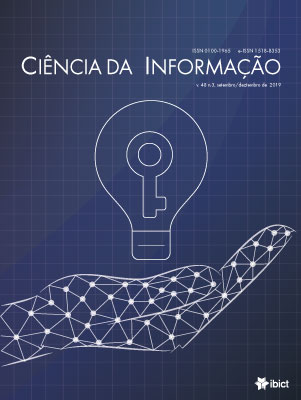Análise de sentimentos em comentários de vídeos do YouTube utilizando aprendizagem de máquinas supervisionada
DOI:
https://doi.org/10.18225/ci.inf.v48i3.4315Keywords:
Análise de sentimentos, YouTube, Português brasileiro, Aprendizagem de máquinasAbstract
O artigo descreve um conjunto de três experimentos em análise de sentimentos, especificamente, para comentários textuais em português brasileiro e para um vídeo do YouTube. Utiliza-se o pacote de mineração de dados Weka para filtragem e um classificador baseado em aprendizagem de máquinas supervisionada (SMO). Os experimentos diferenciam-se pelo corpus a classificar: o primeiro utiliza três classes de polaridade (positiva, negativa e neutra), o segundo e o terceiro experimentos trabalham com duas classes (negativa e não negativa). No terceiro experimento são selecionadas somente postagens que comentam uma entidade (referente) específica. Os resultados de Acurácia e Medida-F Média são consideravelmente melhores para os experimentos contendo duas classes. O terceiro experimento atinge valores em volta de 81% para as duas medidas citadas, e sugere que quanto mais entidades são comentadas nos discursos do corpus, mais difícil seria a classificação de polaridades.Downloads
References
AFONSO, Alexandre Ribeiro. A referenciação em textos do YouTube: um estudo com vistas à análise de sentimentos| Referenciation in YouTube Texts: a study for Sentiment Analysis. Liinc em Revista, v. 13, n. 2, 2017.
ARAÚJO, Mateus; GONÇALVES, Pollyanna; BENEVENUTO, Fabrício. Métodos para análise de sentimentos no Twitter. In: BRAZILIAN SYMPOSIUM ON MULTIMEDIA AND THE WEB, WEBMEDIA 2013, 19., Salvador, 2013. Proceedings... Salvador: Brazilian Computer Society, 2013.
AVANÇO, Lucas V.; BRUM, Henrico B.; NUNES, M. G. V. Improving opinion classifiers by combining different methods and resources. XIII Encontro Nacional de Inteligência Artificial e Computacional (ENIAC), p. 25-36, 2016.
AVANÇO, Lucas Vinicius; NUNES, Maria das Graças Volpe. Lexicon-based sentiment analysis for reviews of products in Brazilian Portuguese. In: Intelligent Systems (BRACIS), 2014 Brazilian Conference on. IEEE, 2014. p. 277-281.
BALAGE FILHO, Pedro P.; PARDO, Thiago Alexandre Salgueiro; ALUÍSIO, Sandra M. An evaluation of the Brazilian Portuguese LIWC dictionary for sentiment analysis. In: Proceedings of the 9th Brazilian Symposium in Information and Human Language Technology. 2013.
BALAGE FILHO, Pedro; PARDO, Thiago. NILC_USP: A hybrid system for sentiment analysis in twitter messages. In: Second Joint Conference on Lexical and Computational Semantics (* SEM), Volume 2: Proceedings of the Seventh International Workshop on Semantic Evaluation (SemEval 2013). 2013. p. 568-572.
BRUM, H. B.; NUNES, M. G. V. Building a Sentiment Corpus of Tweets in Brazilian Portuguese. In: LREC 2018, Eleventh International Conference on Language Resources and Evaluation, 2018, Miyazaki. Proceedings of LREC 2018, Eleventh International Conference on Language Resources and Evaluation, 2018. v. 1. p. 4167-4172.
DURAN, M. S.; AVANÇO, L.; NUNES, M. G. V. A normalizer for ugc in brazilian portuguese. In: Workshop on Noisy User-generated Text. Association for Computational Linguistics-ACL, 2015.
FARZINDAR, Atefeh; INKPEN, Diana. (Org.). Natural language processing for social media. Morgan & Claypool Publishers, 2015.
FREITAS, Cláudia et al. Vampiro que brilha... rá! Desafios na anotação de opinião em um corpus de resenhas de livros. ENCONTRO DE LINGUÍSTICA DE CORPUS, v. 11, p. 22, 2012.
Downloads
Published
Issue
Section
License
- This publication reserves the right to modify the original, regarding norms, spelling and grammar, in order to maintain the standards of the language, still respecting author writing style;
- The final proofs will not be sent to the authors;
- Published works become Ciência da Informação's property, their second partial or full print being subject to expressed authorization by IBICT's Director;
- The original source of publicaton must be provided at all times;
- The authors are solely responsible fo the views expressed within the article;
- Each author will receive two hard copies of the issue, if made availalbe in print.




























